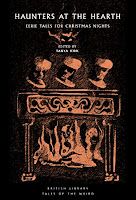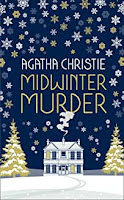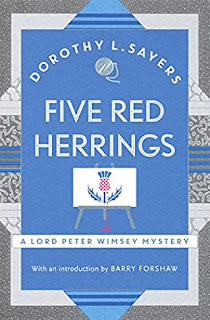So I finished a couple of books and have also been making plans for December (actually, I've been making plans for 2023 but we won't go there just yet...) First up, books read.
In a Glass Darkly, by Irish writer Sheridan Le Fanu, is a book of spooky or weird tales first published in 1872. M.R. James was apparently a big fan of Le Fanu's writing saying he, 'stands absolutely in the first rank as a writer of ghost stories'. Praise from a master. This collection consists of five stories, all of them cases which a Dr. Hesselius has investigated and written about.

The first story, Green Tea, concerns a Reverand Mr. Jennings who has a parish of his own but can't go and preach there because when he does he's haunted by a small, spectral, black monkey that follows him everywhere. That one really creeped me out. The Familiar tells of another similar situation. A Captain Barton gets engaged to a woman in the city of Dublin. Walking home late one night he hears footsteps behind him but when he turns around no one's there. Eventually the presence shows itself to be an old man who haunts the captain, changing his life completely. Mr. Justice Harbottle is a 'hanging judge' as they used to say, merciless and cruel, and the story tells of how he gets his comeuppance via a nasty dream. The Room in the Dragon Volant is a story set in France. The narrator is doing a tour after the fall of Napolean. On the road he witnesses an accident and falls for one of the women involved. He follows them to an inn and gets involved with her and her very elderly husband and things deteriorate from there. This one is not a ghost story but really a mystery made creepy by the excellent writing and setting, although I thought it dragged a bit in places. The final story, Carmilla, is one of Le Fanu's most famous stories. It's set in the forests of Austria, the main protagonist, Laura lives there with her father in a huge old castle. A carriage accident outside the castle delivers to them the injured 'Carmilla' and she stays there with them while her mother goes off on some urgent business. Lonely Laura and Carmilla become good friends but their visitor is a bit strange. Not only that, Laura is sure she recognises her from somewhere. This vampire yarn is effective and atmospheric and who doesn't love a weird story set in an Austrian or German forest! Anyway, not a bad collection, I thought one or two of the stories dragged a bit, if I'm honest, but the writing was superb and the tales never lacked for atmosphere. I had read several before, and recently, so that probably did not help. I would like to read Le Fanu's full length novel, Uncle Silas, at some stage as I think I would rather like it, influenced a bit, I have to admit, by Lark's review.
Next, The Wind in the Willows by Kenneth Grahame. This is my third reading of this iconic classic, written for children and published in 1908, but equally wonderful when read by adults. This qualifies for both the Back to the Classics and the Book Bingo challenge I'm doing.

The main characters in the story are of course Ratty and Mole but the supporting cast is equally as interesting in my opinion: Badger, grumpy and anti-social but kind, Otter, strong and very family orientated, Toad, prone to fads and mad as a bag of ferrets. It's a very long time since I read this book so I'd forgotten how much it resembles a series of long short stories put together in one volume: Mole moving in with Ratty, Mole getting lost in the wild wood, Toad discovering gypsy caravans and then automobiles, Toad going to gaol. And then a wonderful interlude where Ratty meets a Sea Rat who tells him of his travels around the world, almost mesmerising Ratty (and me!) into going with him. I'd totally forgotten that chapter which is odd as it was absolute 'magic'... what a novel that would've made! And lastly, how the Toad question was resolved except that we all know it wasn't really. It's many, many years since I read The Wind in the Willows so I had completely forgotten the beautiful writing and atmosphere of a quiet life lived by the river interrupted by various crises. The artwork in my version, by Robert Ingpen, is fabulous too, my post showing some of the paintings is HERE. For me the best sections in the book are when Mole gets lost in the wild wood and how they subsequently find Badger's home. Also when Ratty and Mole are walking home late one night near Christmas and walk through a human village. And, as previously mentioned, the Sea Rat's tale. Toad I always find annoying and am not so keen on the sections which involve him. All in all, 'gorgeous', 5 stars, and I'll doubtless read it again in a few years.
So, I've just started this:
Winter Solstice by Rosamunde Pilcher. I've wanted to read this for a while now as it comes highly recommended by several devoted Pilcher fans I know. But I wanted to read it at the right time of year and kept missing it somehow. So it's now just a few weeks away from the winter solstice and perfect timing so off I go! I'm only 20 or so pages in and love it already in that way that sometimes you know immediately you start a book that it's going to be a joy.
In December I plan to read some Christmas short stories taken from various books and perhaps do some posts about them.
I also plan to have some fun reading crime fiction for a Booktube event called Cloak and Dagger Christmas which is based around the Twelve Days of Christmas song. There are 12 prompts and I don't expect to do them all but I'm definitely going to try to do the four or five crime book prompts. I don't have a Youtube channel obviously but that's not necessary to take part.
This is the ten minute introduction post from one of the hosts, Janelle at Too Fond of Books:
Cloak and Dagger Christmas
I think that sounds like a 'lot' of fun. (I highly recommend Janelle's channel actually, her love for crime fiction is just glorious.) My first book for it will probably be for the 'Read a book with an alliterative title' and I'll read Jumping Jenny by Anthony Berkeley or Murder in the Mill-Race by E.C.R. Lorac. 'Nobility', probably The Fatal Flying Affair by T.E. Kinsey, although two series that Janelle recs in another vid, Wrexford and Sloane by Andrea Penrose and the Veronica Speedwell books by Deanna Raybourn also sound interesting and might bear investigating next year. 'Foil on the cover'... possibly Rebecca, but we'll see.
Anyway, this post is now long enough methinks! Happy late-November reading and I would love to hear about any plans you have for December/Christmas/Winter reading.





































